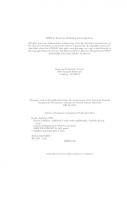Reason's Children: Childhood in Early Modern Philosophy (Bucknell Studies in Eighteenth-Century Literature and Culture) (Buckwell Studies in Eighteenth-century Literatue and Culture) 0838757219, 9780838757215
We still know little of childhood in early modern European thought. By reconstructing philosophies of childhood in the w
294 96 12MB
English Pages 264 [259] Year 2009
2020-07-07-10-40-23
2020-07-07-10-45-12
2020-07-07-10-48-11
Recommend Papers

- Author / Uploaded
- Anthony Krupp
File loading please wait...
Citation preview
Reason' s Children Childhood in Early Modern Philosophy
Anthony Krupp
Lewisburg Bucknell University Press
©2009 by Rosemont Publishing & Printing Corp. Ali rights reserved. Authorization to photocopy items for internai or persona! use, or the internai or persona! use of specific clients, is granted by the copyright owner, pro vided that a base fee of $10.00, plus eight cents per page, per copy is paid directly to the Copyright Clearance Center, 222 Rosewood Drive, Danvers, Massachusetts 01923. [978-0-8387-5721-5/09 $10.00 + 8q, pp, pc.]
Associated University Presses 2010 Eastpark Boulevard Cranbury, NJ 08512
The paper used in this publication meets the requirements of the American National Standard for Permanence of Paper for Printed Library Materials 239.48-1984.
Library of Congress Cataloging-in-Publication Data Krupp, Anthony, 1968Reason's children: childhood in early modern philosophy / Anthony Krupp. p. cm. lncludes bibliographical references and index. ISBN 978-0-8387-5721-5 (alk. paper) 1. Children and philosophy. I. Title. Bl05.C45K78 2009 305.2301-dc22 2008021403
PRINTED IN THE UNITED STATES OF AMERICA
For Sylvia Papazian Krupp, who.1e in/ancy and toddlerhood pa.1.1ed aJ thû book wa.1 written.
Contents
Acknowledgments
Introduction
9
13 24
l. Descartes: Purging the Mind of Childish Ways 2. Locke and Leibniz: Understanding Children
49
3. Locke: Children's Language and the Fate of Changelings 4. Leibniz: Against Infant Damnation
107
5. Wolff: The lnferiority of Childhood
137
6. Baumgarten: Childhood and the Analogue of Reason Afterword
180
Appendix: Pierre Bayle, Re.1ponde to the Que.1tÛJnJ of a Provincial, Chapters 177-78 183 Abbreviations Notes
203
Bibliography Index
200
253
243
80
164
Acknowledgments
T
HANKS ARE DUE TO SEVERAL COLLEAGUES WHO GAVE ME SUBSTANTIAL feedback on one or more chapters: Traci Ardren, Adriana S. Benzaquén, Anne Cruz, Viviana Diaz-Baisera, Simon Evnine, John Fitzgerald, Ralph Heyndels, Horst Lange, Gema Perez-Sanchez, Elliott Schreiber, Maria Stampino, Frank Stringfellow, Amie Thomasson, Bridget West, Paul Wilson, and Barbara Woshinsky. Particular thanks are due to David Ellison, who read several versions of the manuscript and provided canny guidance throughout. I am indebted to John Lyon for inviting me to speak on "Damned Babies" in January 2006 at the University of Pitts burgh. I would also like to thank Risto Hilpinen for his conversational generosity in our accidentai meetings and strolls. I am much obliged to Bucknell's anonymous reader, whose invaluable suggestions have im proved this study. My Bayle translation was polished according to the expert feedback of Karyn H. Anderson, David Ellison, and Barbara Woshinsky. Gabri elle Rapke assisted with Descartes's Latin, checking several quotations and translating part of a letter to Descartes. My translations from the early modern Latin of Zanchius and Baumgarten were improved by the kind assistance of Joshua Davies and Hugh Thomas. I regard my Baum garten translation as functional, not graceful; I would like to hereby ex press the wish that someone well equipped to do so translate Baum garten's Authetü:a into English soon. A Max Orovitz Research Award provided financial support during the summer months of 2005. For permission to cross-List courses in the departments of History, Philosophy, and Religious Studies, and thereby test a number of ideas, I thank Guido Ruggerio, Steve Sapp, and Har vey Siegel. A version of chapter 6 appeared as "Cultivation as Maturation," Monat





![Chaplains in Early Modern England: Patronage, Literature and Religion (Politics, Culture & Society in Early Modern Britain) (Politics, Culture and Society in Early Modern Britain) [Illustrated]
0719088348, 9780719088346](https://ebin.pub/img/200x200/chaplains-in-early-modern-england-patronage-literature-and-religion-politics-culture-amp-society-in-early-modern-britain-politics-culture-and-society-in-early-modern-britain-illustrated-0719088348-9780719088346.jpg)
![Making Publics in Early Modern Europe (Routledge Studies in Renaissance Literature and Culture) [1 ed.]
0415896088, 9780415896085](https://ebin.pub/img/200x200/making-publics-in-early-modern-europe-routledge-studies-in-renaissance-literature-and-culture-1nbsped-0415896088-9780415896085-c-4121232.jpg)
![Making Publics in Early Modern Europe (Routledge Studies in Renaissance Literature and Culture) [1 ed.]
0415896088, 9780415896085](https://ebin.pub/img/200x200/making-publics-in-early-modern-europe-routledge-studies-in-renaissance-literature-and-culture-1nbsped-0415896088-9780415896085.jpg)

